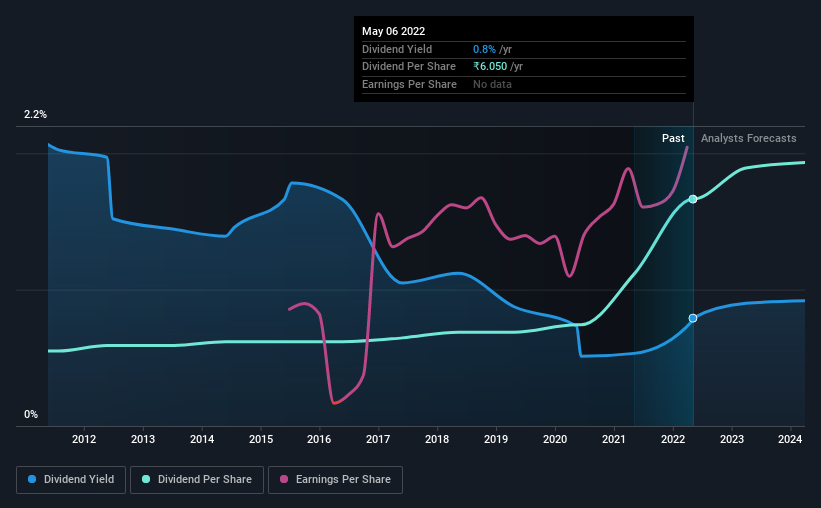Tata Consumer Products (NSE:TATACONSUM) Has Announced That It Will Be Increasing Its Dividend To ₹6.05

The board of Tata Consumer Products Limited (NSE:TATACONSUM) has announced that it will be increasing its dividend on the 27th of July to ₹6.05. This takes the annual payment to 0.8% of the current stock price, which unfortunately is below what the industry is paying.
Check out our latest analysis for Tata Consumer Products
Tata Consumer Products' Payment Has Solid Earnings Coverage
Even a low dividend yield can be attractive if it is sustained for years on end. Prior to this announcement, Tata Consumer Products' dividend was comfortably covered by both cash flow and earnings. This means that a large portion of its earnings are being retained to grow the business.
Looking forward, earnings per share is forecast to rise by 37.9% over the next year. If the dividend continues along recent trends, we estimate the payout ratio will be 49%, which is in the range that makes us comfortable with the sustainability of the dividend.

Tata Consumer Products Has A Solid Track Record
The company has an extended history of paying stable dividends. The dividend has gone from ₹2.00 in 2012 to the most recent annual payment of ₹6.05. This means that it has been growing its distributions at 12% per annum over that time. It is good to see that there has been strong dividend growth, and that there haven't been any cuts for a long time.
The Dividend Looks Likely To Grow
Some investors will be chomping at the bit to buy some of the company's stock based on its dividend history. We are encouraged to see that Tata Consumer Products has grown earnings per share at 10% per year over the past five years. The company is paying a reasonable amount of earnings to shareholders, and is growing earnings at a decent rate so we think it could be a decent dividend stock.
We Really Like Tata Consumer Products' Dividend
Overall, we think this could be an attractive income stock, and it is only getting better by paying a higher dividend this year. The company is easily earning enough to cover its dividend payments and it is great to see that these earnings are being translated into cash flow. All of these factors considered, we think this has solid potential as a dividend stock.
Investors generally tend to favour companies with a consistent, stable dividend policy as opposed to those operating an irregular one. Still, investors need to consider a host of other factors, apart from dividend payments, when analysing a company. Companies that are growing earnings tend to be the best dividend stocks over the long term. See what the 14 analysts we track are forecasting for Tata Consumer Products for free with public analyst estimates for the company. If you are a dividend investor, you might also want to look at our curated list of high yield dividend stocks.
Valuation is complex, but we're here to simplify it.
Discover if Tata Consumer Products might be undervalued or overvalued with our detailed analysis, featuring fair value estimates, potential risks, dividends, insider trades, and its financial condition.
Access Free AnalysisHave feedback on this article? Concerned about the content? Get in touch with us directly. Alternatively, email editorial-team (at) simplywallst.com.
This article by Simply Wall St is general in nature. We provide commentary based on historical data and analyst forecasts only using an unbiased methodology and our articles are not intended to be financial advice. It does not constitute a recommendation to buy or sell any stock, and does not take account of your objectives, or your financial situation. We aim to bring you long-term focused analysis driven by fundamental data. Note that our analysis may not factor in the latest price-sensitive company announcements or qualitative material. Simply Wall St has no position in any stocks mentioned.
About NSEI:TATACONSUM
Tata Consumer Products
Produces, distributes, and trades in food products in India, the United States, the United Kingdom, and internationally.
Flawless balance sheet established dividend payer.


